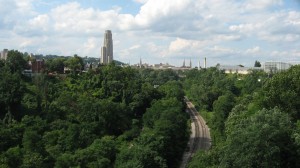What Pittsburgh’s Land Banking Legislation Means For Local Communities

On April 14, 2014, the Pittsburgh City Council passed groundbreaking legislation that is poised to help communities address the growing problem of blight in their neighborhoods.
After years of decline as this industrial-based city struggled to regain its footing when the crucial manufacturing plants closed their doors, this legislation is paving the way for the city and communities to work together. At the center of this legislation is a goal that is focused on the betterment of the citizens of Pittsburgh as it centers around a commodity that is both an asset and a liability. Too many properties throughout the city stand empty, attracting unappealing, and sometimes even harmful, behaviors and reducing property values in the process.
Banishing the Blight With Land Banks
According to the official website for the city of Pittsburgh, a land bank is a government entity that is created and controlled at the local level with support and resources at the state level. Its sole purpose is centered on addressing tax foreclosed and abandoned properties to reduce their negatives and accentuate their possibilities. By amassing, inventorying, managing and marketing these properties, land banks can help make it easier for homeowners to invest in them and their communities.
Land Banks Give Citizens a Fresh Start
With the passage of the land bank legislation, Pittsburgh hopes to utilize this innovative partnership technique as a way to help neighborhoods facing the effects of having abandoned houses and vacant lots bounce back from the troubles that were brought on by abandoned properties. Of the more than 40,000 vacant properties in the city, about 75% of them are not city-owned and are delinquent in their taxes.
This delinquency can result in the tax bill for a property being greater than that property is worth, making it unattractive to buyers. This is particularly true for those buyers who are looking to recoup their investment quickly but face suppressed property values that show no signs of rising in the future.
Benefits to the Community

Land banks provide a number of benefits to the community. Currently there is no system in place to address the variety of different circumstances that resulted in these properties becoming abandoned. In some cases, the proper owners cannot be located. In other cases, speculators hold on to a property, hoping to bide their time so they can sell at a profit. In the meantime, the condition of the properties deteriorates, attracting dumping, trash, drug use, squatting, wild animals and other undesirable behaviors.
Land banks:
- take possession of properties that are tax delinquent, abandoned or otherwise troubled
- are made available to for-profit and non-profit developers
- redevelop and rehabilitate properties
- become valuable, productive and viable parts of the community
- cause property values rise
- cause a sense of community to return
- expel unsavory segments of the population
- revitalize neighborhoods
Land Banks Partner With Community Residents
With the creation of land banks through the recently passed legislation, improvements to these properties at the grass roots level are encouraged. With support and resources provided by the city, the act of revitalizing these abandoned properties becomes easier, more streamlined and quicker. The entire infrastructure of the community is improved as well as its housing markets. This, in turn, raises property values, breathing fresh new life into the whole neighborhood.
By working together with the community’s residents, the land banks strive to help those homeowners who might be delinquent in their taxes to become current. While the land bank is focused on addressing abandoned properties, it does offer support for those homeowners who need resources that enable them to remain in their homes.
